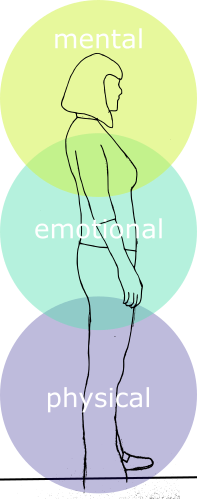A way to deal with overwhelm, inspired by Leopold Kohr
This blog introduces Leopold Kohr and how his “small is beautiful” could be translated into my kind of body language
I spent the last days in my home town of Salzburg. In a conversation, I learned about Leopold Kohr, a philosopher who is from Oberndorf, a small place just outside of the city. I don’t remember specifically what we talked about, but the bigger subject was what is going wrong in our eyes right now and how we could move towards a healthy future.
I’m always happy to learn about interesting people I didn’t know before. This time it was a someone from my hood (think local, right!?)
It has become something of a habit that I try to translate whatever I learn into body terms. I like to call it body language: the way the body communicates with our minds and the environment. It’s about the cues it gives us to move through life in a healthy and sustainable way. I try to take the blueprint of the idea and try to match it with my experience as a physical being and to see what their ideas, propositions, models and metrics have to do with the human experience.
In the next few paragraphs I am attempting to bridge the essence I have grasped about Leopold Kohr’s work (actually just a quote) with how you can deal with overwhelm.
After the conversation, when I was back on the train to Vienna I started researching this guy who grew up not far from me, just many years before. I watched the few videos (in German) I could find about him and looked up his biography.
SMALL IS BEAUTIFUL
Leopold Kohr is known for inspiring the ‘small is beautiful’ movement and in 1983 he won the Right Livelihood Award, which is also known as the alternative Nobel Prize. He was from a tiny place in Austria, but spent most of his life as a cosmopolitan living in New York, Puerto Rico and Wales. His ideas weren’t very popular when he developed them, but he was on to something with his criticism of bigness and the idea that bigger is better. Apparently he predicted the collapse of the Soviet Union. He was a proponent of small organizations, or city states, and famously said
whenever something is wrong, something is too big.
He was of the opinion that the solution of any problem humankind faces, such as poverty, unemployment or war, cannot be reached through unification or collaboration but through division into small communities within manageable regions.
He died before the internet was a thing and the world got super connected through all the channels of communication we are using today. I wonder what he would have thought of the developments we are observing and experiencing now. I personally think we need new ways and solutions for small communities that are connected through bigger networks. But that would be a different story.
I don’t know enough yet to have a clear idea or opinion about him and his work. But his quote stuck with me. The rest of my train journey I spent pondering he thought that problems always have to do with size.
OVERWHELM MEANS SOMETHING IS TOO BIG
And pretty quickly the word overwhelm appeared in my head. It’s the state when you feel something or everything is too much: too many nagging thoughts, too much sadness, too much information, too much tiredness. It’s simply too much.
It’s a state where you feel lost, like a victim of the circumstances and you don’t see how you could handle the big issue that makes up for experience.
My work is about empowering individuals by showing them ways to gain agency in challenging situations by maintaining personal integrity. One of the practices I apply in my work to reach this state is to break the complexities of life down into its elements, with the intention of finding some aspects that you can influence. By becoming aware and present and taking the action that’s in your sphere of influence you regain power over yourself and how you relate to the situation.
PRACTICE THE POWER OF SMALL
You can analyze, write down different things you know about yourself in this situation and gain clarity where you over- or underuse your skills and abilities to deal with the situation in a healthy way.
BREAK IT DOWN INTO 3 CATEGORIES
The three main categories I use for this process are mental, emotional and physical awareness. You can be aware how you think, how you feel and how your body is.
if you know this state of overwhelm and want to dissolve it, you can make a mindmap or list with those three categories. The act of writing already makes it more real to you. And seeing in which of those three levels you write the most or least, might be an indicator what’s very relevant to address.
It might be that when you describe the state you realize that you get very emotional, and dizzy in the head, but that you don’t feel your body very much.
A possible next step could be to become more physical, for instance by breathing consciously, to become more present and to be able to take the emotional wave without getting lost and keeping a clear head.

Breaking a complex situation where you’d like to have more agency down into manageable bites is one practice that allows you to change on all levels – mental, emotional and physical-, but not by trying to change everything at once. You gain trust by focusing on one element that is relevant and that you are aware of. It’s a step-by-step process that works. Always.
This and more key practices that make my work work and so enjoyable, I defined together with my friend and colleague Aninia this July. If you’re curious, you can get a look at our core practices we share and teach in our work that aims at creating agency of individuals and communities through integrity. They can be applied to learning journeys you go on by yourself, one-to-one coachings and bodywork sessions as well as group formats like workshops and Inquiry Groups.
And that’s it for today. I have no idea if this translation from general to body specific makes any sense to you. I hope it might spark some more thoughts in you and me and everyone we know.
What do you think of the idea that when something is wrong, it’s too big? Does it resonate? Do you disagree? If you have any comments or thoughts you’d like to share – there’s a comment box below!


0 Kommentare